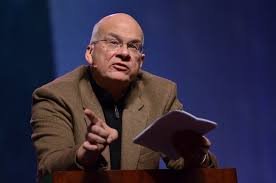Tim Keller was an American pastor, theologian, and Christian apologist. He was the president and founder of Redeemer City to City. This organization trains priests for ministry around the world. He was also the founding pastor of Redeemer Presbyterian Church in New York and the New York Times bestselling author of The Prodigal God: Recovering the Heart of the Christian Faith (2008), Prayer: Experiencing Awe and Intimacy with God. (2014), and The Reason for God: Belief in an Age of Scepticism (2008). The prequel to the latter is Making Sense of GOD: An Invitation to the Sceptical (2016)
Bio
Age- 72 years
Full Name-Timothy James Keller
Born – September 23, 1950
Birthplace- Allentown, Pennsylvania, U.S.
Died- May 19, 2023 (aged 72)
Death place- New York City, New York, U.S.
Education- Bucknell University (BA)
Gordon-Conwell Theological Seminary (MDiv)
Westminster Theological Seminary (DMin)
Occupation(s)-Minister and author
Notable work-Pastor of Redeemer Presbyterian Church | timothykeller.com
Spouse- Kathy Kristy (m. 1975)
Children-3
Ordination-Presbyterian Church in America
Theological work
Tradition or movement
- Christianity
- Presbyterianism
- Lutheranism (formerly)
Main interests-Neo-Calvinism and Evangelicalism

Family
Timothy James Keller was born in Allentown, Pennsylvania in 1950 to Louise A. Keller (Clemente) and television advertising executive William B. Keller.
Tim Keller’s brother died of AIDS after a long life as a homosexual. He returned to his faith toward the end of his life, but Keller said the experience taught him to be compassionate toward homosexuality. Perhaps he finds it difficult to speak venomously against homosexuality like other preachers. I have noticed that people who minister to addicts rarely speak with the same venom against drug addiction as other ministers. Why? Because they understand the struggle against drugs and have learned to more effectively communicate God’s love and truth to drug addicts. Speaking carefully and compassionately about the drug does not mean you agree with the addiction. It just means you know how to serve addicts more effectively. Perhaps Keller’s approach to homosexuality was shaped not by trying to appease the mob, but by serving his brother.
Wife
The name of Keller’s wife is Kathy Keller
Kathy Keller received her MA in theological studies at Gordon-Conwell Theological Seminary. Kathy cowrote The Meaning of Marriage and The Songs of Jesus with Tim. This is their fourth collaboration.
Children
The Keller’s have three sons, David, Michael, and Jonat

Education
Keller was a graduate of Bucknell University (B.A., 1972), Gordon-Conwell Theological Seminary (M.Div., 1975), and Westminster Theological Seminary, where he received a D.Min. in 1981 under the supervision of Harvey M. Conn. Although he attended a Lutheran church in America during his education, he became a Christian at Bucknell University through the ministry of InterVarsity Christian Fellowship. Keller later worked as an employee of InterVarsity.
Keller was ordained by the Presbyterian Church in America (PCA). Keller served nine years as pastor of West Hopewell Presbyterian Church in Hopewell, Virginia while also serving as director of church planting for the PCA. He also served on the faculty of Westminster Theological Seminary in Philadelphia, where he and his wife, Kathy Keller, engaged in urban ministry.
Career
In 2008, Keller published his first book since 1989, a report to his face value on diaconate ministries and grace ministries. The Reason of God was based on common objections to Christianity that he heard while serving in New York. The book rose to number seven on the New York Times nonfiction bestseller list.

Redeemer Presbyterian Church
Redeemer Presbyterian Church has grown from 50 people to more than 5,000 people every Sunday since 2008, leading some to call Keller “the most successful Christian evangelist in town”. In 2004, Christianity Today hailed Redeemer as “one of Manhattan’s premier churches.”
Redeemer Presbyterian Church also founded the non-profit Hope for New York, which sends volunteers and grants to more than 40 faith-based ministries serving New York’s social needs, the Centre for Faith and Work to train professionals in Christian theology, and Redeemer. City to city train and finance priests in New York and other cities.
Keller was a founding member of The Gospel Coalition, a group of Reformed leaders in the United States. His mentoring of younger church leaders such as Scott Salus in Nashville and Steve Chong in Sydney increased his influence worldwide.
On July 1, 2017, Keller resigned as senior pastor of Redeemer Presbyterian Church. The move was part of a larger vision to shift his efforts from preaching to training the next generation of church leaders and planting new churches in global cities through Redeemer City to City
Theological Views
Keller avoided the label “evangelical” because of its political and fundamentalist implications, preferring to call himself orthodox because “he believes in the importance of personal conversion or regeneration and the full authority of the Bible.” identified with Calvinist theology, although. some in that tradition criticized him for teaching this interpretation. He has been described as a “doctrine-friendly up-and-coming pastor” and a “neo-Calvinist”.
Gospel Versus Religion
The centrepiece and foundation of Keller’s ministry was his doctrine of evangelical doctrine, which emphasized the doctrines of total depravity, undeserved grace, and substitutionary atonement. This teaching is summarized in his often-used explanation: “The gospel is this: We are more sinful and flawed than we ever dared to believe, but at the same time we are more loved and accepted in Jesus Christ than we ever dared. believe. Hope.” This understanding of the gospel contrasts with what Keller calls “traditional religion” (which he defines as a set of rules, rituals, or practices through which an individual can win salvation or favour with God) and “irreligiousness” (which he calls defined as the belief that there is a god or that one does not need his popularity). This has been called the “third way of the gospel” or the “gospel-cantered” approach. Typical of that teaching is his interpretation of the Parable of the Prodigal Son (see The Lost God), based on the teaching of one of Keller’s mentors, Edmund Clowney.
Apologetics
Keller’s apologetic preaching and writing is characterized by a respectful orientation to an educated and sceptical audience outside the faith. His clearest work on the subject was The Reason for God, which he produced because of conversations he had with thousands of sceptical New Yorkers during his ministry (Reason, xix).
Regarding creationism, Keller stated that his view is not strictly literal, and that evolution is “neither closed nor excluded” in his church. Keller wrote on the subject for the Bio logos Foundation.
Keller’s greatest influences in apologetics were C.S. Lewis, Cornelius Van Till, John Stott, Alvin Plantinga, and Miroslav Volf
Idolatry
Another central theme of Keller’s teaching was idolatry based on the teachings of Martin Luther and Juan Calvin and the Ten Commandments and other parts of the Bible. Keller argued that modern idolatry continues today as an addiction or devotion to money, career, sex, power, and anything other than God that people want to give meaning and satisfaction to life (detailed in his book False Gods).
Social Justice And Politics
Keller rejected the “social gospel” that characterized main Protestant churches, which favours liberal political reasons and downplays the doctrines of sin and substitutionary sacrifice. However, he also criticized the evangelical alliance with the Republicans, arguing that Christianity is a much broader global movement that subscribes to some liberal and some conservative themes (and criticizes both). He justified giving to charity and caring for the needs of the poor through biblical texts such as the Torah and the parable of the Good Samaritan.
Cultural Inclusion
Thanks in part to his congregation of upwardly mobile Manhattanites, Keller was at the forefront of applying Christian theology to secular pursuits such as business, the arts, and entrepreneurship. The Redeemer Faith and Work centre sponsored business competitions and theological training for working professionals. His views on Christianity and culture are presented in his books Every Good Endeavor and canter Church. Keller was passionate about C.S. Lewis and J.R.R. Tolkien, both well-known Christian authors, and supported the Harry Potter novels, which were considered pagan by certain conservative Christians.
Sex And Gender
Keller held a complementary view of gender, which believes that the Bible teaches defined roles for both sexes, but the specific duties associated with each gender role are undefined. He felt that “marriage offers the personal growth that comes from relationships between the sexes.” He discussed the biblical view of sex and marriage in his book The Meaning of Marriage and believed that homosexual sexual behaviour was unbiblical. Keller signed the Manhattan Declaration and opposed abortion, but not contraception.
Cities And Urban Church Planting
At Westminster Theological Seminary, Keller was mentored by Harvie Conn, an early proponent of urban ministry. He was recruited to find the Presbyterian Church of the Redeemer due to the lack of biblical orthodox churches in downtown Manhattan. He gave a full speech on the subject at the Lausanne conference in 2010.
Through Redeemer City to City, Keller led and led a network of urban churches that represented similar ministry values around the world.[49] He wrote extensively about the importance of cities and in his book Keskuskirkko offered a biblical theological framework for urban ministry.

Books
- Resources for Deacons: Love Expressed through Mercy Ministries (Christian Education and Publications, 1985)
- Ministries of Mercy: The Call of the Jericho Road (P&R Publishing, 1997)
- Church Planter Manual (Redeemer Presbyterian Church, 2002)
- The Reason for God: Belief in an Age of Scepticism (Dutton Adult, February 2008)
- The Prodigal God: Recovering the Heart of the Christian Faith (Dutton Adult, November 2008)
- Counterfeit Gods: The Empty Promises of Money, Sex, and Power, and the Only Hope that Matters (Dutton Adult, October 2009)
- Generous Justice: How God’s Grace Makes Us Just (Dutton Adult, November 2010)
- King’s Cross: The Story of the World in the Life of Jesus (Dutton Adult, February 2011)
- The Meaning of Marriage: Facing the Complexities of Commitment with the Wisdom of God (Dutton Adult, November 2011)
- The Freedom of Self Forgetfulness: The Path to True Christian Joy (10Publishing, March 2012)
- canter Church: Doing Balanced, Gospel-Cantered Ministry in Your City (Zondervan, September 2012)
- Every Good Endeavor: Connecting Your Work to God’s Work (Dutton, November 2012)
- Galatians For You (The Good Book Company, February 2013)
- Judges For You (The Good Book Company, August 2013)
- Walking with God through Pain and Suffering (Dutton, October 2013)
- Encounters with Jesus: Unexpected Answers to Life’s Biggest Questions (Dutton, 2013)
- Romans 1-7 For You (The Good Book Company, February 2014)
- Prayer: Experiencing Awe and Intimacy with God (Dutton, 2014)
- canter Church Europe (Wijnen, Uitgeverij Van, 2014) Contributors are José de Segovia, Leonardo De Chirico, Michael Herbst, Frank Hinkelmann, Martin de Jong, Jens Bruun Kofoed, Daniel Liechti, András Lovas, David Novak, Stefan Paas and Martin Reppenhagen.
- Romans 8-16 For You (The Good Book Company, February 2015)
- Preaching: Communicating Faith in an Age of Skepticism (Viking, June 2015)
- The Songs of Jesus: A Year of Daily Devotionals in the Psalms (Viking, November 2015
- Making Sense of GOD: An Invitation to the Skeptical
- Hidden Christmas: The Surprising Truth Behind the Birth of Christ (Viking, Nov 2016)
- God’s Wisdom for Navigating Life: A Year of Daily Devotions in the Book of Proverbs (Viking, Nov 2017
- The Prodigal Prophet: Jonah and the Mystery of God’s Mercy (Viking, Oct 2018)
- The Meaning of Marriage: A Couple’s Devotional: A Year of Daily Devotions (Viking, Nov 2019)
- How to Reach the West Again (Redeemer City to City, 2020)
- On Birth (Penguin Books, 2020
- On Marriage (Penguin Books, 2020)
- On Death (Penguin Books, 2020)
- Hope in Times of Fear: The Resurrection and the Meaning of Easter (Viking, March 9, 2021)
- Forgive: Why Should I and How Can I? (Viking, November 1, 2022)
- Contributions in edited volumes
- “Puritan Resources for Biblical Counselling”. The Journal of Pastoral Practice. 9 (3): 11–44. 1988.
- Schaller, Lyle E, ed. (1993), canter City Churches: The New Urban Frontier, Abingdon Press
- “Preaching to the Secular Mind”. The Journal of Biblical Counselling. 14 (1): 54–62. Fall 1995.
- Bustard, Ned, ed. (2000), It Was Good: Making Art to the Glory of God, Square Halo Books,
- Carson, DA, ed. (2002), Worship by the Book, Zondervan
- Piper, John; Taylor, Justin, eds. (2007), The Supremacy of Christ in a Postmodern World, Crossway Books,
- Willard, Dallas, ed. (2010), A Place for Truth: Leading Thinkers Explore Life’s Hardest Questions, IVP Books
- Cunningham, Richard, ed. (2017), Serving the Church, Reaching the World: Essays in Honour of Don Carson, IVP UK
- Keller, Tim; Inazu, John, eds. (2020), Uncommon Ground: Living Faithfully in a World of Difference, Nelson Books
Interviews
- Amanpour, Christiane (2011). Interview with Pastor Tim Keller, ABC News This Week, April 24.
- Bark horn, Eleanor (2011), “How Timothy Keller Spreads the Gospel in New York City, and Beyond” The Atlantic, February 21, 2011.
- Batchelder, Kate (2014), “God Isn’t Dead in Gotham” Wall Street Journal, Dec 20–21, 2014.
- Kristof, Nicholas (2016). “Pastor, Am I a Christian?” New York Times, December 25, p. SR19.
- Wehner, Peter (2019). “The Moral Universe of Timothy Keller” The Atlantic, December 5, 2019.
- Lee, Sophia (2021). “Pastoring the City” World Magazine, December 9, 2021.
- Bobrow, Emily (2022). “Pastor Timothy Keller Speaks to the Head and the Heart” Wall Street Journal, September 2, 2022.
Cause Of Death
Timothy Keller died Friday morning after a battle with pancreatic cancer, a tweet from his account announced on Twitter.
Keller’s death is a loss for the Christian community and the world. He was a gifted communicator and a powerful witness of God’s love. His legacy will continue to inspire people for years to come.
In the days and weeks since Keller’s death, many people have shared their memories of her. His wife, Kathy, said he was “a man of deep faith, deep intellect and boundless compassion.” His son David said he was “a loving husband, father and grandfather and a faithful pastor and friend. Keller’s death is a reminder that life is short and that we must make the most of every moment. It also reminds us that death is not the end, but the door to eternal life with God.
Net Worth
Tim Keller Net Worth & salary
Net Worth (2023)-$2 million
Net Worth (2022)- $1 million
Salary (Yearly)-$1 million
Fun Facts
- In 2006, New York magazine listed Keller at the top of the city’s most influential people around religion.
- While in Philadelphia in the 1980s, Keller was active in evangelizing the city’s Muslims, according to the author’s profile.
- Keller said that author C.S. Lewis’ writings formed the basis of his work at the Ministry, says the 2015 Creative Festival author profile.